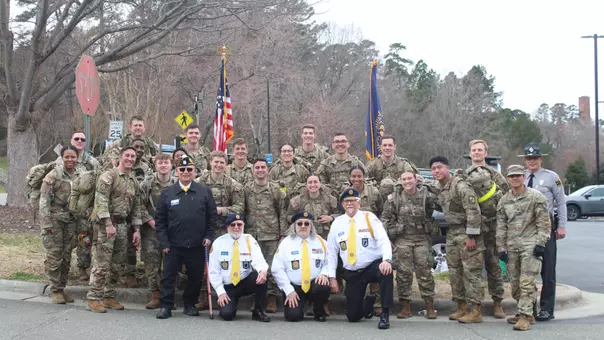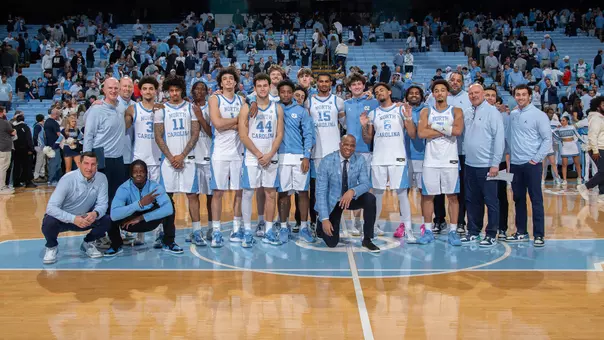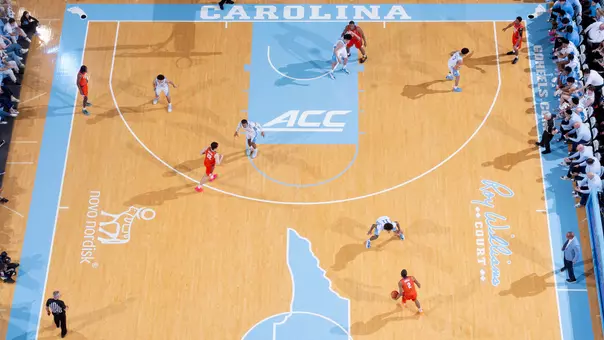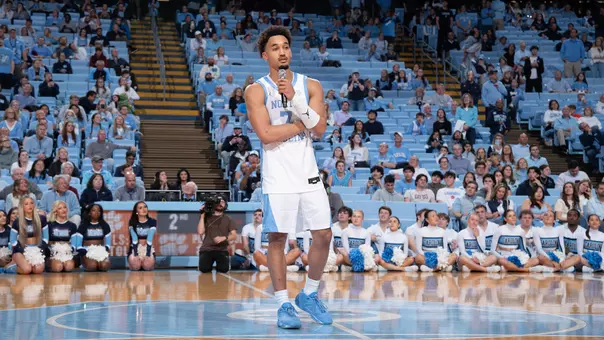University of North Carolina Athletics
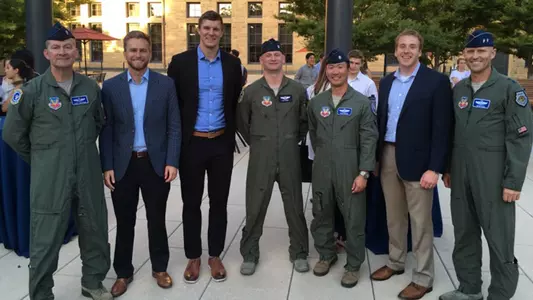
Lucas: Seymore's Success Continues To Evolve
September 4, 2019 | Men's Basketball, Featured Writers, Academics, Adam Lucas
By Adam Lucas
Most of us played Trivia Crack. Unlike Sasha Seymore, most of us did not use the game as a spark that led us to help create an app that has already found clients at the highest levels of Division I athletics, and is also on the verge of spreading to military uses.
But that's not unusual for Seymore, whose diverse post-Carolina life has already included stops in Northern Ireland, the Navy reserve's Direct Commission Officer School, and Stanford business school.
Seymore, who joined the 2014-15 Tar Heels as a walk-on, was at a team dinner the week of the first Duke game when he noticed his teammates were addicted to the then-popular game Trivia Crack. As a Morehead-Cain Scholar, he was the team's go-to resource when they faced a stumper. The game's addictive qualities intrigued Seymore.
"I remember thinking to myself, 'These guys love this game, and it's the night before the biggest game of their lives,'" Seymore says. "I wondered if we could develop something they were this excited about learning that would help them on gameday."
Seymore had discussed the idea with his roommate, former UNC student body president Andrew Powell, and the duo liked the idea of bringing a Rosetta Stone-type approach to a sports playbook. But it mostly stayed just talk as the highly accomplished pair pursued other activities—Seymore won the prestigious George L. Mitchell Scholarship, which supported his graduate study in Northern Ireland, and Powell worked at the African Leadership University in Mauritius.
They reunited as graduate students at Stanford (the modest Seymore won't volunteer this, but he's a Knight-Hennessy Scholar, one of the most sought-after graduate scholarships at Stanford, named partially in honor of Nike's Phil Knight), where they continued the discussions they'd had at Carolina. "One day, we just finally said, 'Let's do something,'" Seymore said.
And they did. They wrote a quick overview of what Learn to Win might look like, and Seymore secured a meeting with former Carolina head football coach Larry Fedora, who was bullish about the potential. Seymore and Powell guided the project through a launch that now includes approximately 50 college athletic program users, approximately 100 high schools, and a high-profile inclusion in a summer prep football all-star game.
Not surprisingly, Seymore wasn't content to stop with sports. After a lifelong curiosity about the military, he recently went through Direct Commission Officer School with the Navy. With the help of Powell and two other Stanford grad students, the group has modified Learn to Win to meet military training needs, which largely use the same relatively outdated teaching approaches as many athletic programs. Their efforts won them a $30,000 top prize at a nationwide competition sponsored by the U.S. Department of Defense.
What's next? If you know anything about Seymore, you know it could be anything with a worldwide application—or it could be something very close to home. He is currently working with Tar Heel assistant coach Hubert Davis to expand the app's usefulness even further; the goal is for newcomers to the Carolina basketball program to be able to receive a crash course in Tar Heel history simply by using the app.
Seymore, a New Bern native, knows that players like Lennie Rosenbluth or Charlie Scott are well-known to him but less familiar to, say, a freshman from Reynoldsburg, Ohio. Soon, Jeremiah Francis will be able to use Learn to Win software both to learn the finer points of Roy Williams' secondary break and to discover the relevance of the 1957 Tar Heels. It's that type of attention to detail that has already made Learn to Win--and Seymore's post-Carolina career--a success.
"I love sports," Seymore says. "One of the first things they gave us as part of the Knight-Hennessy Scholar program was a copy of Phil Knight's book, Shoe Dog. In the book, Mr. Knight talks about going on a run, and as he is on a run he has the feeling of being an athlete and pushing himself to the edge, and how he could get that same feeling from business. That's how I want to push myself and how I want my career to feel—I want to feel like I'm an athlete again. Working on Learn to Win has made me feel that way. I don't know where it will go, but I love creating and building something new."
Most of us played Trivia Crack. Unlike Sasha Seymore, most of us did not use the game as a spark that led us to help create an app that has already found clients at the highest levels of Division I athletics, and is also on the verge of spreading to military uses.
But that's not unusual for Seymore, whose diverse post-Carolina life has already included stops in Northern Ireland, the Navy reserve's Direct Commission Officer School, and Stanford business school.
Seymore, who joined the 2014-15 Tar Heels as a walk-on, was at a team dinner the week of the first Duke game when he noticed his teammates were addicted to the then-popular game Trivia Crack. As a Morehead-Cain Scholar, he was the team's go-to resource when they faced a stumper. The game's addictive qualities intrigued Seymore.
"I remember thinking to myself, 'These guys love this game, and it's the night before the biggest game of their lives,'" Seymore says. "I wondered if we could develop something they were this excited about learning that would help them on gameday."
Seymore had discussed the idea with his roommate, former UNC student body president Andrew Powell, and the duo liked the idea of bringing a Rosetta Stone-type approach to a sports playbook. But it mostly stayed just talk as the highly accomplished pair pursued other activities—Seymore won the prestigious George L. Mitchell Scholarship, which supported his graduate study in Northern Ireland, and Powell worked at the African Leadership University in Mauritius.
They reunited as graduate students at Stanford (the modest Seymore won't volunteer this, but he's a Knight-Hennessy Scholar, one of the most sought-after graduate scholarships at Stanford, named partially in honor of Nike's Phil Knight), where they continued the discussions they'd had at Carolina. "One day, we just finally said, 'Let's do something,'" Seymore said.
And they did. They wrote a quick overview of what Learn to Win might look like, and Seymore secured a meeting with former Carolina head football coach Larry Fedora, who was bullish about the potential. Seymore and Powell guided the project through a launch that now includes approximately 50 college athletic program users, approximately 100 high schools, and a high-profile inclusion in a summer prep football all-star game.
Not surprisingly, Seymore wasn't content to stop with sports. After a lifelong curiosity about the military, he recently went through Direct Commission Officer School with the Navy. With the help of Powell and two other Stanford grad students, the group has modified Learn to Win to meet military training needs, which largely use the same relatively outdated teaching approaches as many athletic programs. Their efforts won them a $30,000 top prize at a nationwide competition sponsored by the U.S. Department of Defense.
What's next? If you know anything about Seymore, you know it could be anything with a worldwide application—or it could be something very close to home. He is currently working with Tar Heel assistant coach Hubert Davis to expand the app's usefulness even further; the goal is for newcomers to the Carolina basketball program to be able to receive a crash course in Tar Heel history simply by using the app.
Seymore, a New Bern native, knows that players like Lennie Rosenbluth or Charlie Scott are well-known to him but less familiar to, say, a freshman from Reynoldsburg, Ohio. Soon, Jeremiah Francis will be able to use Learn to Win software both to learn the finer points of Roy Williams' secondary break and to discover the relevance of the 1957 Tar Heels. It's that type of attention to detail that has already made Learn to Win--and Seymore's post-Carolina career--a success.
"I love sports," Seymore says. "One of the first things they gave us as part of the Knight-Hennessy Scholar program was a copy of Phil Knight's book, Shoe Dog. In the book, Mr. Knight talks about going on a run, and as he is on a run he has the feeling of being an athlete and pushing himself to the edge, and how he could get that same feeling from business. That's how I want to push myself and how I want my career to feel—I want to feel like I'm an athlete again. Working on Learn to Win has made me feel that way. I don't know where it will go, but I love creating and building something new."
Players Mentioned
UNC Women's Lacrosse: Humphrey Fires Tar Heels Past Clemson, 12-9
Thursday, March 05
UNC Softball: Long Ball Propels Heels Over Stetson, 12-4
Thursday, March 05
THE ARENA DISCUSSION - Episode 2: Rick Steinbacher
Wednesday, March 04
MBB: Seth Trimble Senior Speech - March 3, 2026
Wednesday, March 04

